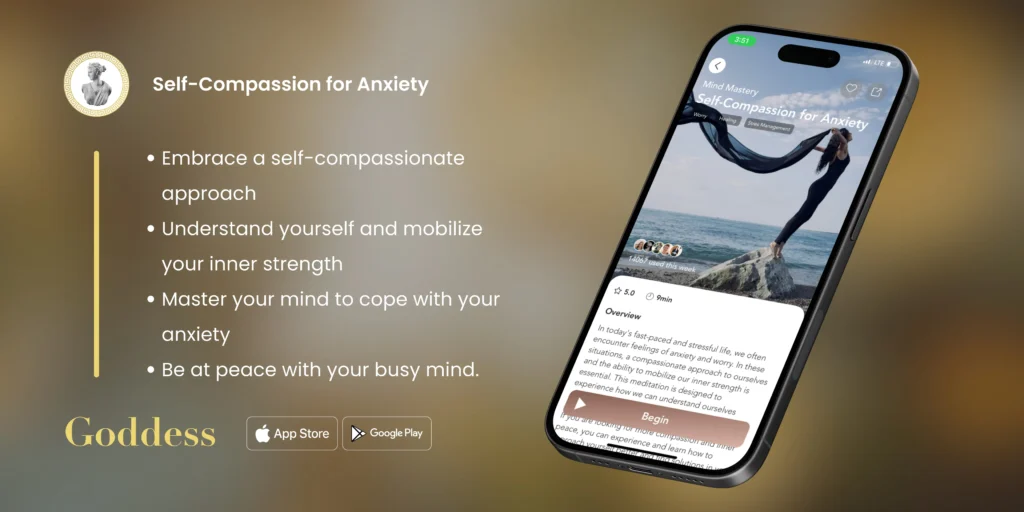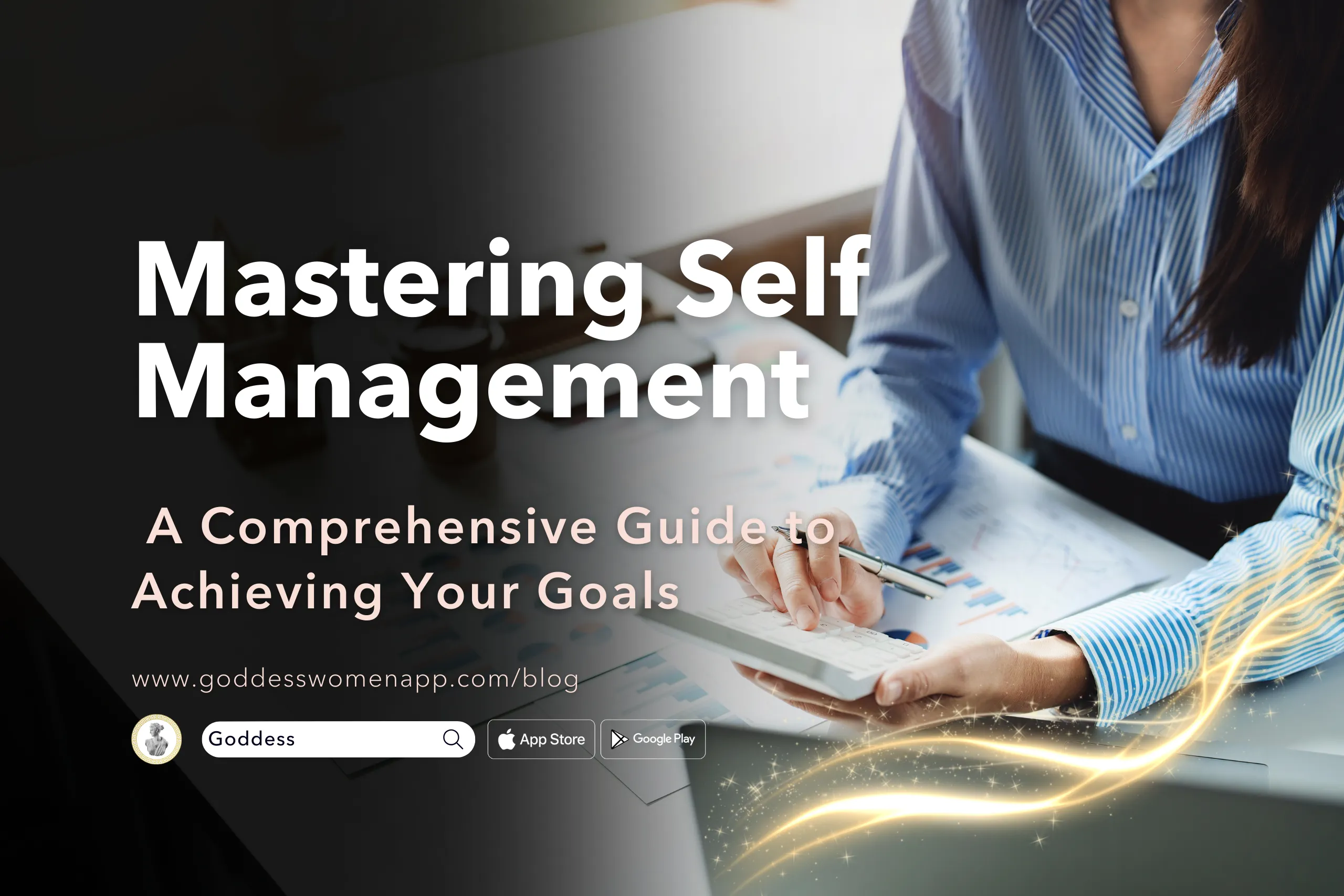Nowadays, self management has become an essential skill for achieving personal and professional success. It’s about taking control of your actions, making informed decisions, and managing your time and resources effectively. Mastering self management not only helps you reach your goals but also enhances your overall well-being.
In this comprehensive guide, we’ll delve into various strategies and techniques to help you become a master of self management. Plus, we’ll explore how Goddess, a women’s empowerment and well-being platform, can support your journey toward effective self management.

What is Self Management?
Definition and Importance
Self management is the ability to regulate and control your own behavior, emotions, and thoughts to achieve specific goals. It encompasses setting goals, managing time, staying motivated, and maintaining emotional balance. Effective self management is crucial because it enables you to stay focused, be productive, and maintain a sense of control over your life. It’s the foundation for personal growth, career advancement, and overall satisfaction.
Core Components
Self management involves several core components:
- Time Management: Efficiently allocating your time to tasks and activities.
- Self-Discipline: The ability to stay focused and stick to your plans.
- Goal Setting: Defining clear and actionable objectives.
- Emotional Regulation: Managing your emotions to remain balanced and productive.
Setting Clear Goals
SMART Goals
One of the fundamental aspects of self management is setting clear, achievable goals. The SMART criteria—Specific, Measurable, Achievable, Relevant, and Time-bound—provide a framework for creating effective goals. Here’s how to use SMART goals:
- Specific: Clearly define what you want to achieve. For example, “I want to increase my sales by 20% within the next six months.”
- Measurable: Establish criteria to track your progress. For example, “I will track my sales performance weekly.”
- Achievable: Ensure that your goal is realistic and attainable. For example, “With a solid marketing strategy, increasing sales by 20% is achievable.”
- Relevant: Make sure the goal aligns with your broader objectives. For example, “Increasing sales will contribute to my company’s growth.”
- Time-bound: Set a deadline for achieving your goal. For example, “I will achieve this by the end of the six-month period.”

Short-Term vs. Long-Term Goals
Balancing short-term and long-term goals is crucial for sustained success. Short-term goals provide immediate focus and motivation, while long-term goals offer a broader vision for the future. For example:
- Short-Term Goal: “Complete the market research for my new product within the next two weeks.”
- Long-Term Goal: “Launch the new product and achieve a market share of 10% within the next year.”
Time Management Techniques
Prioritization
Effective time management begins with prioritizing tasks. Use methods like the Eisenhower Matrix, which categorizes tasks into four quadrants:
- Urgent and Important: Tasks that need immediate attention.
- Important but Not Urgent: Tasks that are important but can be scheduled for later.
- Urgent but Not Important: Tasks that are urgent but not crucial to your goals.
- Not Urgent and Not Important: Tasks that are neither urgent nor important and can be minimized or eliminated.
Another method is the ABC method, where you rank tasks as A (high priority), B (medium priority), or C (low priority) based on their importance and urgency.

Scheduling
Creating an effective schedule helps you allocate time for various tasks and activities. Consider using tools like digital calendars, planners, or time-blocking techniques. Time-blocking involves setting aside specific blocks of time for focused work on particular tasks. For example, you might allocate two hours in the morning for project work and an hour in the afternoon for meetings.
Avoiding Procrastination
Procrastination can hinder your productivity. To overcome it:
- Break Tasks into Smaller Steps: Large tasks can be overwhelming. Break them down into smaller, manageable steps.
- Use the Pomodoro Technique: Work for 25 minutes, then take a 5-minute break. After four cycles, take a longer break.
- Set Deadlines: Establish deadlines for each task to create a sense of urgency.
Developing Self-Discipline
Building Habits
Self-discipline is about forming positive habits and breaking negative ones. Start by identifying the habits you want to build or change. Use techniques like habit stacking (linking a new habit to an existing one) and setting up reminders to reinforce your new habits. For example, if you want to start exercising regularly, you could pair it with your morning routine.
Staying Motivated
Maintaining motivation is essential for self management. Here are some tips:
- Visualize Success: Imagine achieving your goals and the benefits that come with it. Visualization can boost motivation.
- Reward Yourself: Set up a reward system for completing tasks or reaching milestones.
- Surround Yourself with Support: Seek support from friends, family, or mentors who encourage and motivate you.

Emotional Regulation
Recognizing Emotions
Being aware of your emotions is crucial for effective self management. Recognize how your emotions affect your behavior and decision-making. For example, feeling stressed might lead to procrastination, while feeling motivated can enhance productivity.
Managing Stress
Managing stress is vital for maintaining balance and productivity. Techniques include:
- Mindfulness: Practice mindfulness or meditation to stay grounded and manage stress.
- Deep Breathing: Use deep breathing exercises to calm your mind and body.
- Exercise: Regular physical activity can reduce stress and improve overall well-being.
Balancing Work and Personal Life
Setting Boundaries
Creating boundaries between work and personal life helps maintain a healthy balance. Set clear limits on your work hours and stick to them. Communicate your boundaries to colleagues and family to manage expectations.
Self-Care
Self-care is an integral part of self management. Engage in activities that promote relaxation and well-being, such as:
- Exercise: Regular physical activity helps reduce stress and improve mood.
- Hobbies: Pursue hobbies and interests that bring you joy and relaxation.
- Socializing: Spend time with friends and family to strengthen relationships and boost emotional well-being.

The Role of Goddess in Self-Management
Introducing Goddess
Goddess is a women’s empowerment and well-being platform designed to support women in their personal and professional lives. By offering a range of resources focused on feminine energy, empowerment, and holistic well-being, Goddess provides tools and guidance that can significantly enhance your self-management skills.
Benefits of Goddess for Self-Management
- Empowerment Through Knowledge: Goddess offers a wealth of information on self-care, empowerment, and personal growth. By accessing these resources, you can gain valuable insights and strategies to improve your self-management practices.
- Holistic Well-Being: The platform emphasizes a holistic approach to well-being, including physical, emotional, and spiritual aspects. This comprehensive focus supports your overall health and enhances your ability to manage stress and maintain balance.
- Community Support: Goddess fosters a supportive community where you can connect with like-minded women through Instagram and TikTok accounts. Sharing experiences and seeking advice from others can provide motivation and encouragement in your self-management journey.
- Practical Tools: From guided meditations to goal-setting workshops, Goddess offers practical tools and techniques that can help you implement effective self-management strategies in your daily life.
Reflecting and Adjusting
Regular Reflection
Regularly reflect on your progress and assess whether your strategies are working. Set aside time for self-reflection to evaluate your achievements, challenges, and areas for improvement. This practice helps you stay on track and make necessary adjustments.
Learning from Mistakes
Mistakes are opportunities for growth. Instead of viewing them as failures, use them as learning experiences. Analyze what went wrong, identify the lessons learned, and adjust your approach accordingly.

Conclusion of Self Management
Mastering self-management is a continuous journey that requires practice, patience, and self-awareness. By setting clear goals, managing your time effectively, developing self-discipline, and taking care of your emotional well-being, you can achieve your objectives and lead a more balanced, fulfilling life. Goddess can be a valuable ally in this journey, offering resources, community, and support to help you enhance your self-management skills.
What are your top self-management challenges? How has Goddess helped you in your journey? Share your thoughts and experiences in the comments below, and let’s continue the conversation on how to improve our self-management skills with the support of empowering platforms like Goddess.
Read more:




